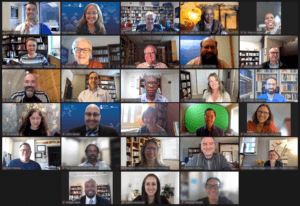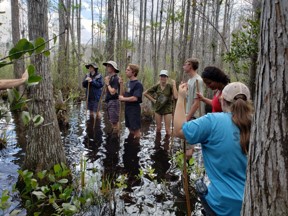In November 2023, representatives from 14 theological institutions joined scientific and faith experts to discuss climate science and how it can be incorporated into education, conversation, and curriculum at their schools. This virtual meeting launched AAAS DoSER’s new Climate Science in Theological Education (CSTE) project. The goals of this 3-year initiative are to equip current and future faith leaders to lead their communities in addressing climate change and to create an atmosphere in places of worship where climate science is considered relevant, complementary, and important to religious worldviews.

Attendees of CSTE Cohort 1 smile during a zoom meeting | DoSER staff
The participating institutions in the first cohort include the Academy for Jewish Religion (NY), Austin Presbyterian Theological Seminary (TX), Columbia Theological Seminary (GA), Ecumenical Theological Seminary (MI), Graduate Theological Union (CA), Hood Theological Seminary (NC), Iliff School of Theology (CO), Knox Theological Seminary (FL), Lexington Theological Seminary (KY), the Miller Center for Interreligious Learning and Leadership of Hebrew College (MA), Palm Beach Atlantic University Graduate School of Ministry (FL), Portland Seminary of George Fox University (OR), Regis College (ON, Canada), and Seventh-Day Adventist Theological Seminary (MI). In addition to being geographically diverse, the schools represent Jewish and Evangelical, Mainline Protestant, and Roman Catholic Christian theological education institutions. Eight of the institutions have worked with DoSER on past projects to engage science in theological education, while the rest of the cohort represents new partners for DoSER in this work.
DoSER’s CSTE project will encourage participating institutions to engage climate-related science in ways that are tailored to the specific students, faculty, alumni, and faith communities that they serve. Activities funded through the grant can include capacity building, curriculum engagements, ministry/leadership-focused activities, or other program activities. The scientific topics that the projects address are varied, as are the methods of engagement. Proposals highlight issues of environmental justice, air quality and health, extreme weather, food security, agriculture and soil science, marine science and ecology, climate migration, and similar topics. Many of the schools have decided to host multiple activities and engagement opportunities.
One example of updated coursework comes from the Academy for Jewish Religion. Their Counseling course will now include a section on climate bereavement to work with students to help them better understand the issue of climate bereavement and how it may impact their communities.
“Many in the Jewish world believe in climate change, but they may not understand the effects on us physically, emotionally, or psychologically. Or they may have some understanding of these things, but feel overwhelmed,” said Jill Hammer, project co-lead and Director of Spiritual Education at AJR. “We hope that through our project we will equip our students and graduates to be informed and to inform their communities accurately about climate change, and to address their emotional and psychological needs.”

Biology students from Palm Beach Atlantic University visit the Grassy Waters Preserve, West Palm Beach, Florida | Image credit: Thomas Chesnes, PBA
Capacity building and ministry-focused activities vary from webinars to lunch-and-learns to visiting nearby natural areas. Thomas Chesnes, project co-lead, Associate Dean of Sciences, and Professor of Biology at Palm Beach Atlantic University, described his school as “ground zero for directly observing the effects of climate change.” Throughout his work, he found that “a picture’s worth a thousand words, but getting people up to their waist in the mud of a degraded ecosystem…that speaks a million words. These experiences drive points home.” Paul Gould, Director of the Master of Arts in Philosophy of Religion and project co-lead, added that in the spring of 2025, they plan to bring a cohort of 10 students and faculty to the Florida Keys or Everglades to “get down into the water, into the nitty gritty, to see what’s going on with climate.”
Finally, all schools will host an event that will be open to the entire school and wider community. In response to the massive northern forest fires last year, Regis College, University of Toronto, will host a panel discussion on “Climate Change and Forest Fires in North America.” One expert will explore the implications of eco-anxiety in the context of the Canadian forest fires, and a religious leader will share pastoral experiences from affected areas in Canada. Jaroslav Sikra, Inaugural Dean of Regis-St. Michael’s Faculty of Theology, explained that “[the enveloping smog from the fires] raised questions about pastoral care of those who are seeing and immediately being affected by the effects of climate change. This includes airborne pollution, issues of asthma, quality of care,” and more.
The Climate Science in Theological Education project builds upon the success of DoSER’s previous Science for Seminaries: Integrating Science into Core Theological Education project (2016-2023), as well as a 2022 pilot project in incorporating climate science into seminary curricula. Science for Seminaries equipped religious leaders with a solid scientific foundation to answer their community’s questions about issues related to science and technology. Selected seminaries had to integrate science into at least two core courses and produce at least one campus-wide science-themed event. Science topics included astronomy, genetics and gene editing, evolution, public health, neuroscience and mental health, and more.
“One of the main lessons we learned [from Science for Seminaries] is that on a high level, the relationship at bridging Judaism and science is simple enough. But when you get into the details, and all the scientific data and all of the minutiae, that’s where it becomes a real challenge to show the levels of applicability and points of intersection between science and Judaism,” said Matthew Goldstone, Assistant Academic Dean and project co-lead from the Academy for Jewish Religion.
Allowing institutions to contextualize their approach to climate science engagement is key to the success of the project. Thomas Chesnes summarized the conflict he often sees when engaging with religion and science: “In my experience, especially in religious contexts, you need to understand where people are coming from. You need to understand their deep-rooted presuppositions, what underlies their viewpoints.”
Initial funding for the Climate Science in Theological Education project is provided by the David and Carol Myers Foundation and Leslie Sternlieb, private donor. Applications for Cohort 2 are open until April 1, 2024. Click here for more information and to apply.




